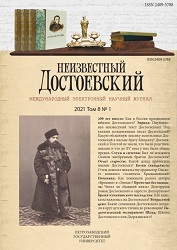Было ли доходным имение Достоевских?
Was the Dostoevsky Estate Profitable?
Author(s): Tatyana Nikolaevna DementyevaSubject(s): Cultural history, Local History / Microhistory, 19th Century
Published by: Петрозаводский государственный университет
Keywords: M. F. Dostoevskaya; M. A. Dostoevsky; M. M. Dostoevsky; А. M. Dostoevsky; Savin Makarov; Darovoe; Cheremoshnya; landowner’s estate;
Summary/Abstract: In August 1831, the parents of Fyodor Dostoevsky purchased an estate in the Kashirsky district of the Tula Province, consisting of the hamlet of Darovoe and the village of Darovaya. In February 1833, they bought the neighboring village of Cheremoshnya. The entire property, including the above-named villages and hamlet, also included land plots in the wastelands: Nechaeva, Trypillya, Harina, Shelepova and Chertkova. Having become the owners of 58 peasant souls and more than 500 dessiatines of land, the Dostoevskys were considered average local landowners. However, Darovoe, well-known as the childhood place of the writer Fyodor Dostoevsky, remains poorly studied from an economic point of view. One of the reasons is that today there are very few documents that could reliably indicate the economic condition of the estate for the memorial period. An exception is the monograph of V. S. Nechaeva “In the Dostoevsky family and estate,” published in 1939, where, based on the correspondence of M. F. Dostoevskaya and M. A. Dostoevsky, the author claims that the estate they acquired was not merely unprofitable, but also caused a family tragedy. The opinion of V. S. Nechaeva became fundamental for researchers of the writer’s biography. However, this issue can be revised today, which is what the presented work is devoted to. The correspondence of Fyodor Dostoevsky’s parents, the letters of his older brother M. M. Dostoevsky, who was the guardian over the estate and the Memoirs of the younger brother of A. M. Dostoevsky in the aggregate allow to take a fresh look at the estate and the income it brought. In the context of this problem, it is of interest to refer to the newly published “Report of the headman of the village of Darovoe Savin Makarov to Mikhail Mikhailovich Dostoevsky” dated October 8, 1850. The document was discovered in the Russian State Archive of Literature and Art and complements the well-known sources on the economic condition of the Dostoevsky estate.
Journal: Неизвестный Достоевский
- Issue Year: 8/2021
- Issue No: 1
- Page Range: 77-102
- Page Count: 26
- Language: Russian

